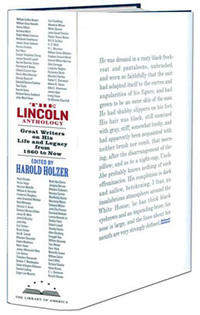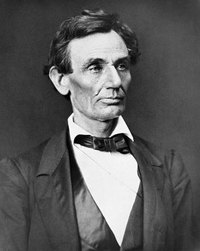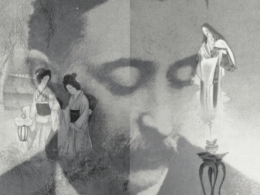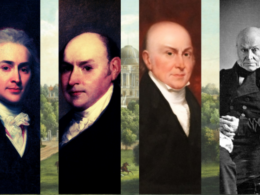
In connection with the publication in January 2009 of The Lincoln Anthology: Great Writers on His Life and Legacy from 1860 Until Now, edited by Harold Holzer, Rich Kelley conducted this exclusive interview for The Library of America e-Newsletter.
LOA: Spanning 1,000 pages, The Lincoln Anthology collects 110 pieces from 95 different writers—journalists, biographers, poets, playwrights, statesmen. What criteria did you use to decide what to include?
Holzer: I imposed several criteria: literary value, historical importance, impact on the culture, and diversity of voice. All these measurements are reflected here—and one more: durability. In the case of writers like Whitman and Sandburg (the latter too often neglected, even denigrated, by the literati but beloved by the masses), it is a pleasure to exhume prose and poetry, and remind 21st-century readers of their substantial impact on their respective generations. Lincoln recollection has been around so long that the recollectors’ reputations have ebbed and flowed as often as has Lincoln’s. Our goal was to showcase a breadth and quality of observation—meant to surprise and, one hopes, too, to dazzle. One final confession: I do love the occasional obscure or arcane comment by the unexpected source—like Karl Marx or Dale Carnegie, which remind us of the extent to which Lincoln has inhabited the American (and international) consciousness. I know we ended up omitting much that deserved inclusion. But I hope we erred on the side of worthy plenty!
LOA: Only the first seventeen pieces—a little more than ten percent of the book—are contemporaneous with Lincoln’s life. The focus of the volume thus becomes a documentary history of how Lincoln’s image has changed over time. Are there common trends in this evolution across this diverse mix of writers?
Holzer: It should surprise no one that Lincoln inspired more writers after his murder and apotheosis than he did as a living, breathing, occasionally infuriating and controversial politician. Some contemporaries, like Hawthorne, Whitman, and Stowe, saw early in Lincoln’s style and his own writing ability something worth cherishing. Inevitably, Lincoln memory evolved along with national self-image: in times of crisis and coalescence born of fear (translation: 2008) we tend to cherish him. In times of malaise or cynicism (the ’70s) he is vulnerable to much criticism, even assault. In short, he is not only our national saint, but our national mirror—reflecting and refracting our ever-changing views of ourselves as a people.
LOA: The longest contributions are from William Herndon, Lincoln’s law partner of 17 years, who seems to have dedicated his life after Lincoln’s death to demythologizing him, and Carl Sandburg—who began by writing poems about Lincoln and ended up creating a Pulitzer Prize–winning biography. Would you say that these two writers represent opposing poles of portraying Lincoln: Herndon adamantly reductive, Sandburg effusively adulatory? Is each equally untrustworthy?
Holzer: I’m not sure Herndon and Sandburg represent opposing poles precisely—though they certainly can make a claim for influencing their eras, and beyond. The latter was a gifted writer infused with and inspired by the passing of the heroic Civil War generation, the former a Lincoln contemporary who wanted to filter all Lincoln memory through the alembic of his own biases. Each dominated his field, but the difference is that Sandburg won fame and fortune for his pursuits, while Herndon earned condemnation from Lincoln’s surviving friends and family, and died dissolute and penniless. Today, Herndon is by far the more influential—because his “oral history” of Lincoln, the interviews of Lincoln’s acquaintances that he conducted on the prairie, have been resurrected and re-appraised by scholars Douglas Wilson and Rodney Davis and hugely influenced a whole new generation of historians. What an irony. Sandburg, who was so famous he got to recite the Gettysburg Address on the Ed Sullivan Show, and delivered the main address to a joint session of Congress at the Lincoln Sesquicentennial in 1959, is now in something of a critical decline (a trend I hope this collection reverses), while Herndon, maligned and ostracized in his time, is now considered the mother lode of all source material. That is why both get so much attention in this book: they have earned it!
LOA: Do you have any favorites among the entries?
Holzer: This is a tough one. It calls for Solomonic wisdom which I don’t think I possess. I like them all—why else feature them? Well, all right, I admit a special fondness for “O Captain! My Captain!” not only because Whitman was compelled to recite it as an encore at every reading he ever did, but because we were compelled to memorize and recite it in the 1960s in grade school—an unbroken arc of unwanted recollection that somehow stands up to the scrutiny of the ages and gives you new respect for vaudeville audiences and schoolteachers. It’s a link to my own introduction to Lincoln memory; how could I not love that staccato meter?
LOA: The most moving and controversial pieces are the many written by African-Americans: Booker T. Washington, Frederick Douglass, W.E.B. Du Bois, Lerone Bennett Jr. Would you say that Douglass’s unflinching assessment of Lincoln as being “preeminently the white man’s president” set the stage for scholars like Lerone Bennett Jr. to later write a charged piece like “Was Abe Lincoln a White Supremacist?”
Holzer: I suppose a case can be made that Frederick Douglass’s skepticism informed Lerone Bennett’s hostility 100 years later. I included my friend Lerone though we disagree almost violently about Lincoln because I believe his voice deserves to be heard. It has been a profoundly influential voice—Bennett has done more to dethrone Lincoln as “Great Emancipator” than any other critic. But I think sometimes that he forgets—or ignores—that eleven years before Douglass called Lincoln the “white man’s president” he hailed him as the “black man’s president.” Did Lincoln change? Or did Douglass change? And to what degree did both Douglass and Bennett hold Lincoln responsible for the stalled promise of the second American Revolution he did not live to lead?
*LOA:*_The entry by Robert Russa Moton, Booker T. Washington’s successor as principal at Tuskegee Institute, is especially striking because you are publishing here for the first time the original speech he planned to give at the dedication of the Lincoln Memorial in 1922 but was asked to change because the Memorial Commission found it too inflammatory. The original speech contains lines like “this memorial which we erect in token of our veneration is but a hollow mockery, a symbol of hypocrisy unless we together can make real in our national life, in every state and in every section, the things for which he died.” Why did Moton agree to make the changes? And are there other entries that represent first-time publications or little-known works with similar evocative power?_
Holzer: I can’t say there are other unpublished contributions here—after all, the book is designed to resurrect and recall influential writing on Lincoln, and unpublished material is therefore automatically disqualified. Where the Moton contribution is concerned, however, we made an exception: this is what this eloquent, impassioned, frustrated orator meant to say—before his wings were clipped by white censors even as black onlookers in the audience were herded into segregated viewing areas at the far rear of the Lincoln Memorial dedication crowd. It’s a story that infuriates, saddens, and uplifts, all at the same time.

LOA: Lincoln was the first Republican president, but in the years since his death his words have been used by politicians on all sides, Democratic, Republican, and third parties in support of their causes. What is it about Lincoln—were his principles and beliefs really that variegated or that diffuse—that his words can be used in this way?
Holzer: One of the reasons we included political voices in this anthology—Theodore Roosevelt, Woodrow Wilson, Mario Cuomo, to name a few of the gifted writer-leaders we feature here—is that they did indeed do eloquent battle for the Lincoln mantle, party affiliation notwithstanding. Perhaps the most persuasive and influential of these was FDR—who unfortunately (as far as this book is concerned) never expressed himself on Lincoln memorably enough to qualify for inclusion in our collection, yet somehow in Robert E. Sherwood–inspired sound bites, convinced Americans that he, and the New Deal, later internationalist-interventionist Democrats, were Lincoln’s logical political heirs. And the beat goes on—with Barack Obama’s brilliant use of Lincoln’s greatest aphorisms to inspire his own new presidency. In short, politicians regardless of party have claimed Lincoln. This book illuminates why and how.
LOA: The anthology includes entries by numerous poets: more than thirty pages by Walt Whitman alone, and also including poems by John Greenleaf Whittier, Vachel Lindsay, Edward Arlington Robinson, Stephen Vincent Benét, Delmore Schwartz, Robert Lowell, and Allen Ginsberg. Do poets get at something in Lincoln that other writers miss?
Holzer: I think it’s appropriate that poets are so prominent this book—because Lincoln loved poetry: Burns, Keats, Poe, maudlin stuff like William Knox’s “Mortality,” and of course Shakespeare’s great soliloquies, which he committed to memory. Who can doubt that Lincoln’s own greatest speeches approached poetry? There is a kinship there. And don’t forget, Lincoln wrote poetry of his own, which The Library of America included in its anthology of nineteenth-century American poems. It’s no wonder he has inspired poets since.
LOA: It’s illuminating to read the accounts of foreign observers: Henrik Ibsen, Leo Tolstoy, Bram Stoker, Sir Winston Churchill, Donggill Kim. You include two by Karl Marx, one from an 1865 address in which he calls Lincoln “one of the rare men who succeed in becoming great, without ceasing to be good.” Did foreigners come to a different kind of appreciation of Lincoln than Americans?
Holzer: Foreigners were understandably slower to appreciate Lincoln. For one thing, news traveled slowly in those days, and by the time Europeans caught up with Lincoln’s rise, the Civil War was underway and interfering with the normal flow of trade from the New World—think of the inconvenience. I love to remind my English friends that an M. P. named Alexander Beresford-Hope openly preferred Lincoln’s Confederate counterpart, Jefferson Davis, because he looked more presidential! Only when Lincoln died a martyr’s death did foreign writers like Hugo and Tolstoy see brilliance in his life and words. In the end, Lincoln’s reputation flowered most overseas where freedom blossomed least—thus he became a highly useful and inspiring touchstone in the France of Napoleon III.
LOA: I was surprised to find an excerpt from Gore Vidal’s Lincoln: A Novel in this anthology since in the review you wrote for The New York Times of the television adaptation of Lincoln you had expressed concern about the impact its historical inaccuracies might have on Lincoln’s reputation—and this led to a testy exchange between you and Vidal in the pages of The New York Review of Books. Has your attitude toward the factual accuracy of Lincoln: A Novel changed?
Holzer: I had mixed emotions about Gore Vidal’s novel—then and now. But the book was a huge hit, and his vision of an erratic, constipated, egomaniacal Lincoln has been an influence on a whole generation. Besides, if it wasn’t for his miniseries, I never would have met its star, Sam Waterston, whom I interviewed on the set in Richmond in ’84. We’ve been friends and fellow tillers in the Lincoln vineyards ever since—and he’s quite simply the greatest reader of Lincoln’s words who ever lived. So thank you, Mr. Vidal.
LOA: The volume concludes with an Epilogue that recounts two Lincoln-infused speeches by Barack Obama: his 2005 address at the dedication of the Abraham Lincoln Presidential Library and Museum in Springfield, Illinois, and his announcement of his presidential candidacy in February 2007 at the Old State Capitol in Springfield. I wonder if you have any thoughts on the significance of America swearing in a black president in Lincoln’s bicentennial year.
Holzer: It’s hard not to exult that Barack Obama’s triumph signals the completion of the “unfinished work” of American democracy that Abraham Lincoln lamented at Gettysburg. What makes this astonishing historical and political miracle more resonant for me is that Mr. Obama clearly cherishes Lincoln and in his frequent and earnest citation of his greatest messages has radically redirected Lincoln memory through adaptation—and emulation—of Lincoln’s words and style. How extraordinary to have a new President who sees the past as a pathway to illuminate the future—and has made the Lincoln Bicentennial into a national preoccupation instead of an obligation.
LOA: The last three entries in the book all draw from recent works of fiction: Richard Slotkin’s Abe: A Novel of the Young Lincoln(2000), Adam Braver’s Mr. Lincoln’s Wars (2003), and E. L. Doctorow’s The March (2005). As we get further from Lincoln, is it our novelists who are more adept at finding new aspects of Lincoln to explore?
Holzer: The novelists seem to be overriding the poets and playwrights in the early twenty-first century. It’s curious—poetry is in a renaissance, but Lincoln, a subject who once so routinely and nourishingly engaged and inspired poets, has apparently begun intimidating them. It’s time for a Lincoln poetry slam.
LOA: You have written or edited some thirty-one books about Lincoln and are widely considered one of the foremost authorities on his life and work. In fact, Doris Kearns Goodwin has hailed as “stunningly original” your recently published work, President-Elect Lincoln. How did you first become involved with Lincoln? Considering the vast amount of Lincolniana, is it still possible to discover new things about him?
Holzer: I wish my own entry into this endlessly fascinating realm wasn’t so prosaic. No epiphany, no vision, no golden moment, alas. Just a fifth-grade assignment: choose a name from my teacher’s hat and write a biographical composition. I picked Lincoln. Thank you, fate. Thank you, Mrs. Henrietta Janke, for challenging your students and for teaching me how to sign the letter “H” with a flourish. Thank you, my late and lamented school buddy, Dennis Fine, for going first and picking Genghis Khan (Dennis went on to become a rock n’ roll promoter; these childhood influences can be strong!). Thanks too to my revered old friend Richard Nelson Current, whose magnificent book The Lincoln Nobody Knows was the first I pulled from my school bookshelf, and the biggest influence of my Lincoln career. And the fact is, nobody really, fully knows Lincoln: not Dick Current at 96, not me as I near 60, and not the writers represented in the anthology—not entirely . . . and that is precisely why they, and we, keep trying to find him.



